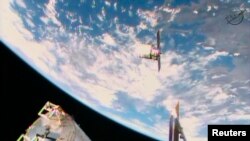An Orbital Sciences Corp. cargo ship reached the International Space Station on Wednesday with a delivery of food, supplies, science experiments and a fleet of tiny Earth-imaging satellites that will be launched from the orbital outpost.
Working from a control panel inside the station's Cupola module, commander Steven Swanson delicately steered the station's 58-foot, or 18-meter, robotic arm to pluck the Cygnus capsule from orbit at 6:36 a.m. EDT (1036 GMT). The ships sailed 260 miles (418 km) above northern Libya.
“I think everyone is breathing again,” NASA robotics officer Melanie Miller radioed to the crew from Mission Control in Houston.
The capsule, named SS Janice Voss in tribute to a five-time space shuttle astronaut who died of breast cancer in 2012, blasted off aboard an Orbital Sciences Antares rocket from Virginia on Sunday.
“We now have a seventh crewmember,” Swanson radioed to Mission Control. “Welcome aboard the ISS, Janice.”
Later on Wednesday, the capsule will be bolted to a docking port on the station's Harmony module so Swanson and his five crewmates can begin unpacking more than 3,600 pounds of food, equipment and supplies.
The cargo includes 28 shoebox-sized satellites for privately owned Planet Labs, which operates a constellation of Earth-imaging satellites. The satellites will be deployed this summer from a small satellite launcher set up in Japan's Kibo module.
“Our goal is to image the whole Earth every day ... and then put it online for people to get access to it,” Robbie Schlinger, co-founder of the San Francisco-based company, told reporters during a prelaunch news conference.
Planet Labs, which already has flown 42 ultra-compact satellites, intends to operate a network of 100 spacecraft. That would allow it to collect images of the entire Earth every 24 hours.
“It's really about getting rich data, to make it actionable and accessible to people,” Schlinger said.
Cygnus is to remain berthed at the station until mid-August. Once unpacked, it will be refilled with trash and other items no longer needed on the spacecraft. The capsule will incinerate as it plunges through Earth’s atmosphere.





